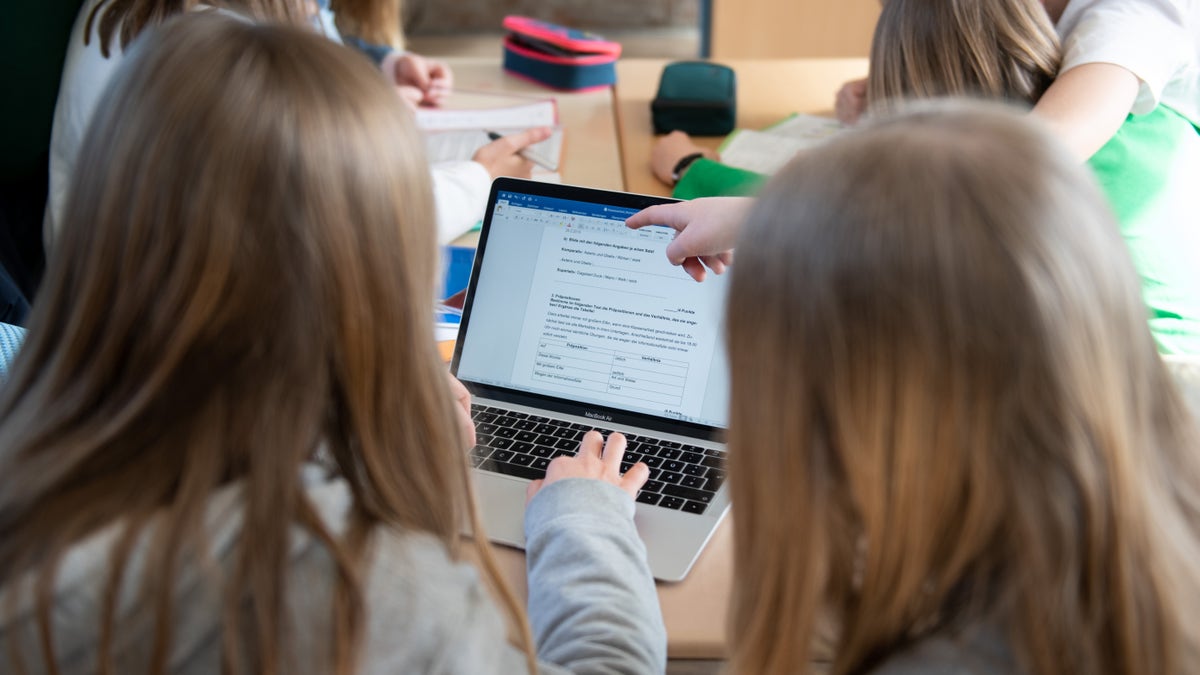
There are ways to protect your children from harm online. (Getty Images)
The truth is, the internet was never really designed for children. Yes, it’s exciting to connect everyone in the world, to celebrate freedom of speech and commerce. The internet provides platforms for unfettered expression, accessible almost anywhere in the world.
But “unfettered expression” doesn’t equate to "kid-friendly." There's pornography. There are violent videos and sexually explicit images. There are evil creeps. There's even the possibility that your child is illegally recorded.
At the same time, modern gadgets are so easy to use, so powerful, and so attractive to young eyes, that it's difficult to police a child's digital life. Good parenting becomes twice as hard when you are glued to your phone; kids imitate their parents, and their lousy tech habits mirror our own.
That’s the main reason I created my own parent-child contract for using technology at home. I urge you to download it, share it, and use it with your family. Tap or click here to get your free copy of my parent-child technology contract.
To keep your child genuinely safe – from both questionable material and active online predators – here is some sage advice for the conscientious parent, as well as the overly curious minor. These may seem like superfluous steps to some, but it's no exaggeration that these measures have saved lives.
Need an example? Tap or click to learn how YouTube is scrambling to scrub away child predators.
1. Limit screen time
Recent research has suggested that screen time does not cause long-term psychological damage among children. I am skeptical, and I look forward to furthering studies. But the most important thing is that screen time doesn't replace family time.
Domestic activities, like making dinner and playing outside, are things that a family can do together, and a screen should not get in the way. When children do use screens, it’s better that they don’t do so in isolation. Watch television, play games, and read together.
Because many games are interactive and can be played with strangers over the internet, it’s vital that parents know how connected that interface is.
2. Have total access to accounts and devices
Your child should never keep a password that you don’t know. It’s one thing to have a private diary hidden in a drawer; it’s something else to communicate with anyone in the world from a social media account you didn’t realize existed.
Children learn and adapt, of course. Many children know their tablets better than their parents do. As they grow older, they may learn ways to work around the security settings on their devices. You have to stay ahead of the curve, and just as importantly, sustain trust and communication with your child.
3. Keep track of all correspondence
There are so many ways to get in touch with people, from Skype to WeChat to direct messaging over Instagram. These are all great ways for adults to meet and keep in touch; they are also potential playgrounds for predators targeting children.
No matter who your children talk to, you should know their identity in real life. Before your son or daughter responds to a message or friend request, make sure they ask your permission.
4. Update your privacy settings
Not only are predators a real online threat, but the digital age has made their pursuits easier than ever. Children don’t even have to speak to strangers, much less type a single word; photos, hometowns, and hobbies all provide helpful clues for the motivated stalker.
Social media sites are constantly updating their privacy settings, and you should, too. Even if you think you’ve updated your privacy settings, double check (see No. 6 in this post -- don't be a "sharent" and overshare photos and info about your kids.)
5. Monitor devices remotely
These tactics should work in most families, but some kids are rebellious, and they won't listen to reason. Some kids can obtain their own devices and accounts, and they will find ways to access the dangerous corners of the internet, consequences be damned.
Some programs are designed to monitor devices remotely. Many parents will see this as a last resort, but you can monitor a live feed of everything your child does online. In dire circumstances, this should provide some relief – and even prevent disaster.
My parent-child tech contract covers all of this and more. It’s the most comprehensive contract of its kind. It covers email, text messaging, gaming forums, passwords, bullying and suicide, and more. You have my permission to download it, print it, and share it.
What digital lifestyle questions do you have? Call Kim’s national radio show and tap or click here to find it on your local radio station. You can listen to or watch the Kim Komando Show on your phone, tablet, television or computer. Or tap or click here for Kim's free podcasts.
Copyright 2019, WestStar Multimedia Entertainment. All rights reserved.
Learn about all the latest technology on the Kim Komando Show, the nation's largest weekend radio talk show. Kim takes calls and dispenses advice on today's digital lifestyle, from smartphones and tablets to online privacy and data hacks. For her daily tips, free newsletters and more, visit her website at Komando.com.
